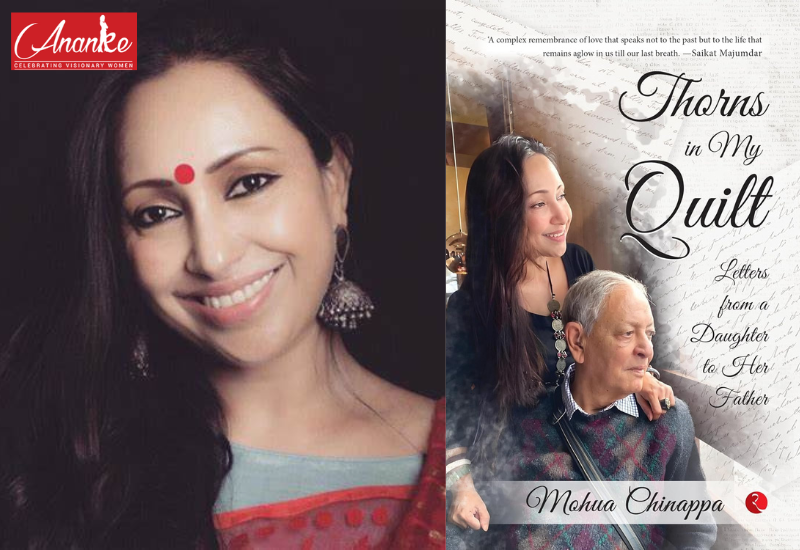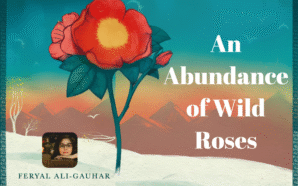In Thorns in My Quilt (Rupa Publications, 2024), Mohua Chinappa stitches together the frayed threads of memory, grief, and identity into a tapestry of aching beauty. Written as a series of letters from a daughter to her deceased father, this deeply personal narrative transcends the form of memoir, entering the realm of literary epistolary art. With an aching vulnerability, Chinappa, addressing herself as Manu, offers a raw yet tender meditation on love, loss, betrayal, and the often paradoxical emotional landscape of parent-child relationships.
Mohua delves into this intricate web through a searingly honest and emotionally textured epistolary narrative. Written in the form of letters from a daughter to her deceased father, the book captures the essence of unresolved emotions, echoing in the silence that follows death.
She writes not just to mourn her father, but to excavate the buried layers of their relationship. The letters unravel her affection-filled early years in Shillong, fragrant with the vanilla essence of butter cookies and tender moments on rain-drenched roads. These fond memories stand in sharp contrast to the emotional distance that creeps in during adulthood. The warmth of childhood gives way to a difficult, often painful dynamic with her father and mother. Her words are filled with sorrow, confusion, and an acute sense of abandonment, particularly as she navigates a broken marriage and personal upheaval without the support she yearned for.
The emotional thrust of the book lies in this unresolved tension, the struggle to understand why the people we love the most can sometimes feel the most absent. Her grief is compounded by the questions she never dared to ask, the conversations forever postponed, and the emotional validation never received. The narrative captures this ache with authenticity and restraint, making the reader feel as though they’ve been entrusted with pages from a deeply private journal.
The cover of Thorns in My Quilt captures a quiet, tender moment between Mohua Chinappa and her father. She stands behind him, hands gently placed on his shoulders, while he sits, aged and still, both of them smiling softly as they look out of a window. The image feels both intimate and restrained, a moment of connection frozen in time, yet suggestive of all that remains unspoken.
This image serves as a visual prelude to the book’s emotional terrain, deeply affectionate yet layered with absence and complexity. It mirrors the central tension of the letters: the daughter’s longing to understand and be understood, to reach across the distance that emotional silence often creates. The shared gaze out of the window becomes symbolic, like the view into another person’s heart, clear in parts but always partially obscured.

Themes and Subthemes
The bond between parent and child is layered with varied meanings and expectations, shaped by duty, affection, care, reverence, and emotional responsibility
At its core, Thorns in My Quilt explores the complexity of familial bonds, particularly the fraught terrain of father-daughter dynamics. Baba, as he is affectionately called, is depicted as a figure of contradictions, both nurturing and distant, affectionate and punishing. This duality is not just an indictment or a lament, but a nuanced exploration of the imperfections in human relationships. The letters reveal the simultaneity of love and resentment, and the reader is invited to sit in that emotional dissonance without judgment.
A central subtheme is grief as a means of self-exploration. The writing does not idealize the dead; rather, it confronts the silence that death imposes and dares to fill it with questions, confessions, and long-overdue truths. The epistolary form becomes a device for catharsis, each letter a stitch in the quilt, sewn with both thorns and silk.
There is also a poignant thread of gender and autonomy, especially visible in Mohua’s recounting of her broken marriage, the absence of familial support, and her eventual reclamation of identity. Her reinvention is quiet but powerful, embedded not in dramatic declarations but in reflective honesty.
One of the most resonant themes in Thorns in My Quilt is the desperate desire to remain relevant in the lives we are closest to, a relevance that is often unexpressed, cloaked in expectation, or denied by emotional distance. This longing is painfully familiar, yet rarely addressed with such directness.
However, while the book’s emotional core is compelling, the narrative occasionally veers off track. Certain passages feel repetitive, circling around the same hurt with little progression. This, though, can be seen as a reflection of the nature of relationships themselves, cyclical, unresolved, and sometimes maddening in their refusal to offer closure. What may seem structurally imprecise could also be interpreted as thematically consistent.
Despite these moments of redundancy, Mohua succeeds in leaving the reader with plenty of food for thought. Her writing is reflective rather than prescriptive, asking more than it answers and that is perhaps its strength. Thorns in My Quilt does not attempt to tidy up the mess of memory and emotion. Instead, it lays it bare, quilted together with tenderness, resentment, yearning, and truth.
This is not merely a daughter’s lament for a lost father. It is a universal meditation on the fragility and depth of human connection, and the thorns we find woven into even the warmest parts of our lives.
Layers of Writing
Mohua’s prose is lyrical without becoming ornate. It meanders like memory itself circling back, revisiting old rooms, inhaling old scents. The narrative structure, non-linear and intimate, mirrors the workings of the human mind in grief and reflection. The sensory detail is especially striking, the aroma of vanilla essence, the hush of Shillong’s rains, the bitter undertones of Delhi’s bureaucratic orderliness, each memory laced with a tactile authenticity.
The letter format allows the author to shed performative restraint. These are not confessions made to a public audience but whispered truths to a silent listener. This lends the book a raw immediacy as if the reader has stumbled upon something sacred and private.
Messaging and Core Ideas
At its heart, Thorns in My Quilt speaks to the necessity of narrative reclamation. In the absence of her father, Mohua reclaims her own story, one that was for years written through the lens of his presence, expectations, and absences. She does not seek closure, a term too neat for the jagged grief she expresses; instead, she seeks understanding. And through that process, readers are gently reminded of the importance of speaking the unsaid before it’s too late or, when that fails, finding a way to say it anyway.
The title itself is deeply metaphorical with the quilt representing warmth, memory, and protection and the thorns evoking pain, complexity, and emotional entanglement. The message is clear:
Life is never just comfort or pain, love or abandonment—it is a patchwork of both.
Importance and Cultural Relevance
In an age where fast-paced communication has replaced the art of letter writing, Thorns in My Quilt resurrects the literary and emotional depth of a slower, more reflective form. It also contributes meaningfully to the canon of Indian women’s writing that reclaims voice, space, and narrative authority, particularly in relation to familial expectations, personal trauma, and societal silences.
Furthermore, Mohua’s reflections are not just personal. They are culturally resonant. Her portrayal of Shillong, Delhi, and the cultural backdrop of a middle-class Indian upbringing offers readers a textured view of both place and psyche. The book becomes a vessel for shared experience, particularly for those navigating the liminal space between tradition and selfhood.
Conclusion
Thorns in My Quilt is a powerful literary achievement, a deeply introspective, emotionally layered work that invites readers to confront the contradictions within love and memory. Mohua Chinappa has not only written to her father; she has written to all of us who have ever longed for an impossible conversation, sought comfort in remembering, or found healing in telling the truth. This book is not just a tribute; it is an act of emotional archaeology, unearthing the buried truths of a life lived in the shadow and light of love.
About Thorns in My Quilt by Mohua Chinappa
‘I miss the long letters we wrote each other when you travelled, which was often.’
Dear Reader,
Thorns in My Quilt is a series of letters written by a daughter to her father after he passed away. Unspoken thoughts, unshared memories and unsaid words combine in this searing and poignant account of a relationship filled with joy, but with equal moments of sorrow.
Mohua Chinappa (Manu) loved her Baba, who was as kind as he was cruel, as well-read as he was unworldly, as loved as he was unloved. His dearest Manu recollects her childhood in Shillong, infused with the aroma of vanilla essence that went into the butter cookies he baked. She reminisces about her father holding her little hand while helping her through the undulating, rain-drenched roads. Mohua returns to Delhi, where she spent a part of her growing-up years, and revels in the memory of a government house with a harsingar tree. She writes to him about her broken marriage, recalls how her parents left her side, and how she reinvented herself. The letters are often selfish yet strangely cathartic.
About the Author
Mohua Chinappa is an author, a columnist, a renowned podcaster in India, a TEDx speaker, a former journalist and a corporate communications specialist.
The Mohua Show, a podcast she started in 2020, has close to 2 million downloads. She contributes regularly to various national dailies and magazines, including The Telegraph, Deccan Herald and Outlook. She is regularly invited as a speaker on TEDx and Josh Talks.
Mohua’s other initiative—NARI: The Homemakers Community—provides a platform for homemakers to voice their everyday challenges.
Her book—Nautanki Saala and Other Stories—was awarded the PVLF Best Debut Non-Fiction (in English) Award 2023. She also has two poetry collections to her credit—If Only It Were Spring Everyday and Dragonflies of My Dreams.











